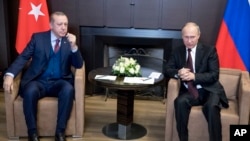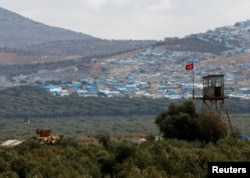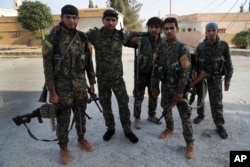Turkish President Recep Tayyip Erdogan met Monday with Russian counterpart Vladimir Putin in the Black Sea resort of Sochi, the fourth encounter between the two leaders this year and part of a warming of relations in the wake of tensions following Turkey's 2015 downing of a Russian warplane operating from a Syrian air base.
But analysts say despite recent images of smiles and warm handshakes between the two leaders, cracks in that rapprochement are starting to show and signs of tension remain.
“Putin and Erdogan, they don't trust each other, particularly true on the part of Putin. He sees Erdogan as unpredictable,” observed Haldun Solmazturk, head of the 21st Century Turkey Institute, an Ankara-based research group. “That is a major problem in international relations and if you don't trust your partner there is not much you can do,” he said.
The hastily arranged Sochi meeting came after Moscow was forced to postpone an international gathering this month in Astana on resolving the Syrian civil war. Turkey threatened to boycott the gathering because of Russia's invitation to the Syrian Kurdish group, the PYD. Ankara accuses the PYD of being linked to the PKK which has been waging a decades-long insurgency in Turkey.
“The Russians invited them [PYD] to Astana over Turkey’s strenuous objections [about] what will Turkey do if they go there. So I see this all very fluid,” said international relations analyst Soli Ozel of Istanbul’s Kadir Has University.
Syria a pivot point
Moscow, like Washington, is courting the Syrian Kurds.
Moscow is aware its ties with Ankara continue to offer important tactical advantages and is treading carefully, analysts say. The two sides are increasingly cooperating in Syria, with Russian and Turkish forces working together to enforce a “deconfliction zone” in the Syrian Idlib region, one of last opposition strongholds.
“Russia obviously needs of Turkey in Syria to try and help control some of the Islamist groups that it feels Turkey’s close to,” says political columnist Semih Idiz of Al-Monitor website. “Turkey is now keeping the peace in Idlib, the most dangerous part of Idlib, and Russia also needs its developing ties with Turkey in order to hit at the West and NATO. When we come to brass tacks [essential facts], when [we] look at Syria, we see the seeds of future problems.”
The Idlib operation is a key issue in Monday’s talks between the Russian and Turkish leaders. “Ankara’s priority is more about containing if not confronting Syrian Kurdish forces in the neighboring Afrin region rather than jihadists,” said Solmazturk. “I cannot see any indication that the Turkish government has any intention to deal with the jihadists, so this looks like a point of tension between Turkey and Russia.”
Ever since Turkish forces were deployed in Idlib, Erdogan repeatedly threatened to attack Syrian Kurds in Afrin, where Russian soldiers are based. But the Turkish president, in a possible overture to Moscow last Friday, appeared to take a step back, insisting his forces in Idlib were only defensive.
Observers note Ankara appears wary of confronting Moscow over its stance towards Kurdish groups in the region. “Russia has not even recognized the PKK as a terrorist organization, so even this illustrates the limit of this rapprochement,” said Sinan Ulgen, a visiting scholar of the Carnegie Europe Institute. The United States and the European Union designate the PKK as a terrorist organization, but Erdogan continues to accuse his Western allies of supporting the group.
Analysts say one factor cited behind Ankara's apparent double standard is Moscow’s willingness to take forceful action. Following Turkey’s 2015 downing of a Russian jet, Moscow slapped crippling sanctions on Ankara that were only recently lifted. “The price of annoying the Russians was pretty steep as we've seen in 2016,” observed Ozel.
Playing both sides
But Ankara’s rapprochement with Moscow continues to provide important diplomatic leverage.
”Ankara has a growing fight with the U.S., Prime Minister [Binali] Yildirim was there recently but it did not really change the scene much. Erdogan has a continuing quarrel with Europe. And he needs a counterbalance to all this, and Russia is providing the counterbalance,” columnist Idiz noted, “Not only because Russia doesn't meddle in Turkey’s domestic affairs regarding democracy, human rights, and freedom of speech, it also provides Turkey with an element of leverage in Syria, and so President Erdogan is not willing to disrupt these developing ties with Russia.”
Ankara’s controversial procurement of Russia's S400 missile system is seen as having as much a diplomatic as military motive, sending a message that Turkey is not beholden to its NATO allies, who strongly oppose the sale.
The sale is reportedly on the agenda of the Sochi talks. But the missile purchase is proving symbolic of the limits of trust between Russia and Turkey, with the sale dogged by an ongoing dispute over how much technology Russia is prepared to transfer. “Ankara is interested both in getting the missiles and in getting operation technology and production. [The] Russian military seems to be concerned over possible know-how-transfer,” noted Zaur Gasimov, an Istanbul-based Russia-Turkey analyst for the Max Weber Foundation.









